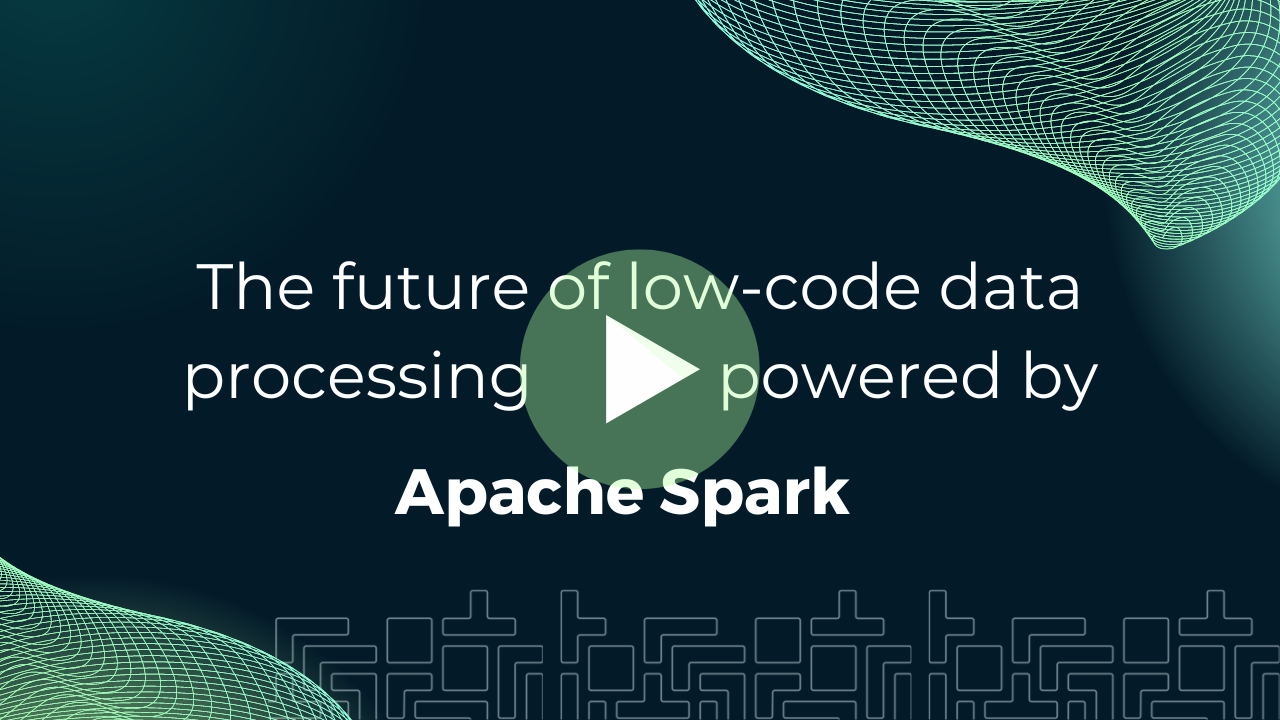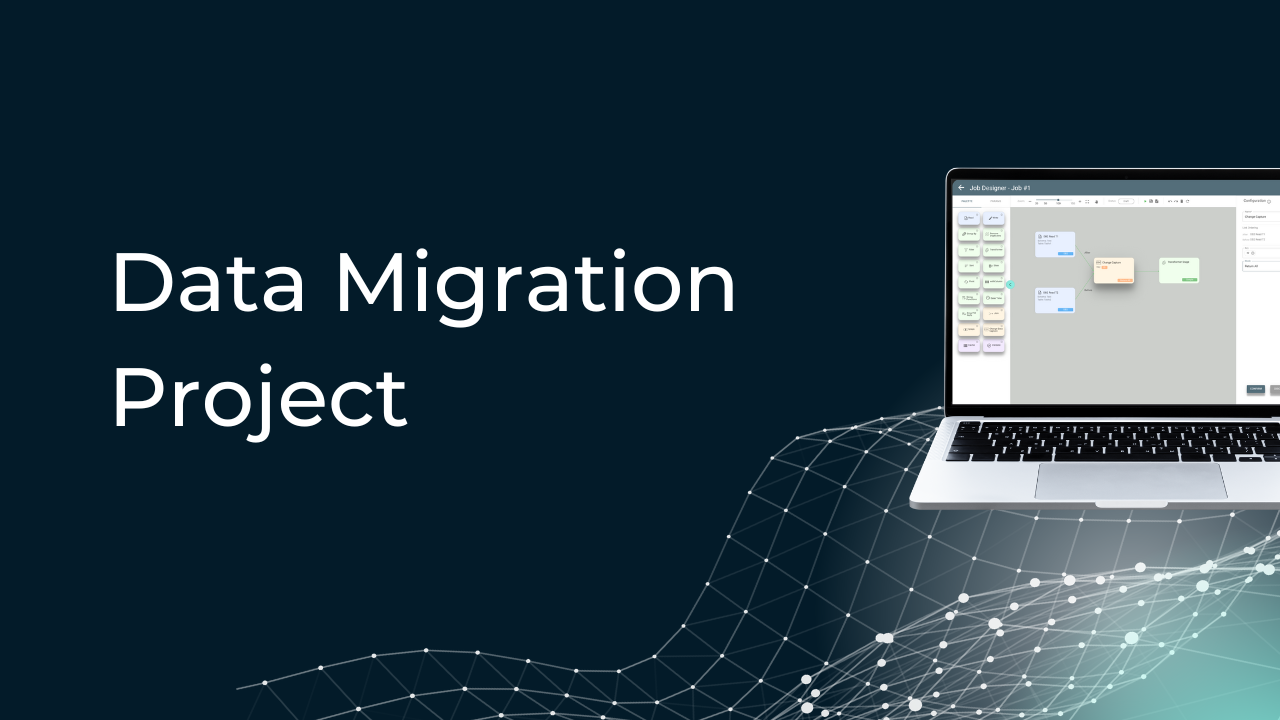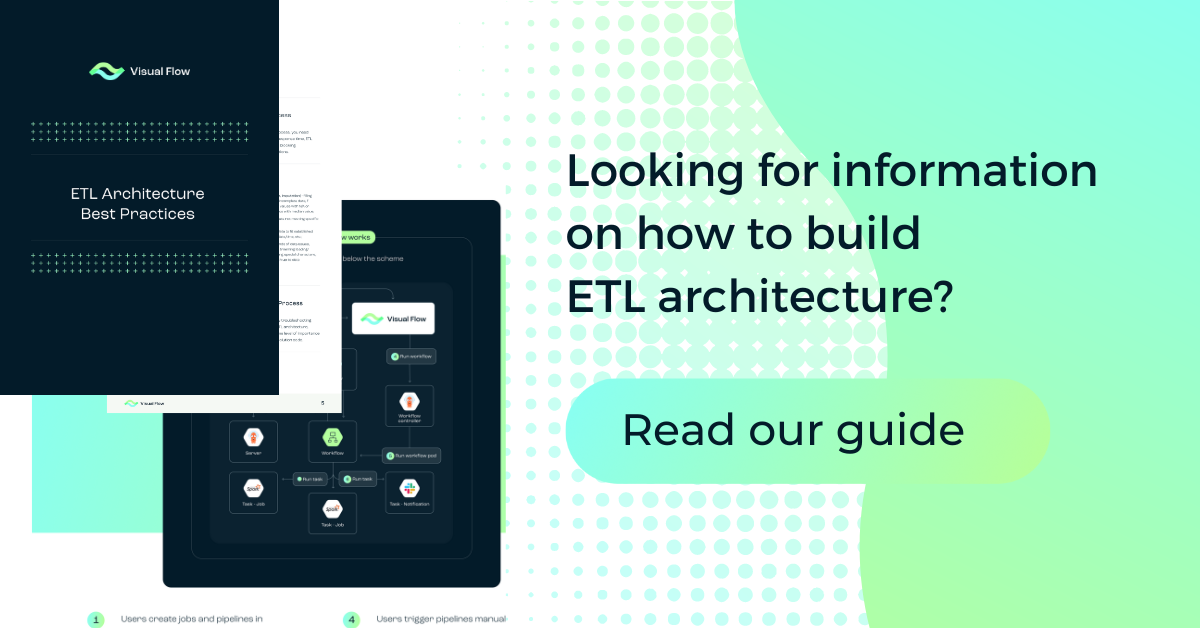
Table of Content:
Table of Content:


When the business heavily relies on keeping and processing loads of data, a well-oiled data pipeline is essential. Truly a backbone of data management, a data pipeline ensures smooth movement to a destination, whether it’s a cloud-based storage, a data warehouse, or an SQL database. And what the destination is is an important aspect, because it determines how data is going to be stored, analyzed, and ultimately used.
An optimized pipeline ensures data is available for quick transformation, decision-making, and analysis. Whether it’s pushing real-time data to cloud applications or moving batch data to SQL systems, a well-designed pipeline ensures seamless data flow, helping businesses stay ahead in the competitive landscape.
Essential Tools for Building a Data Pipeline
It is easy to get overwhelmed by the abundance of different data pipeline tools. So let’s explore what kind of instruments there are:
- Data integration tools. These tools handle bingestion from multiple sources. A great example is Apache Kafka, which excels in real-time ingestion of data streams. Other tools like Talend support both batch and real-time data and work across different platforms and cloud services.
- Transformation tools. Raw data needs to be prepared for usage. Teams can perform data transformations using SQL-based logic with tools like dbt (data build tool) to make sure that the processed data aligns with the company’s specific use case.
- Automation and orchestration tools. Modern data environment needs modern management methods. Apache Airflow and Prefect are excellent for orchestrating complex workflows, scheduling tasks, and automating the entire data flow process, from ingestion to transformation.
Remember, a system that can monitor and provide alerts in case of failure is just what the doctor ordered. Tools like Prometheus and Datadog offer real-time monitoring, ensuring that the health of the pipeline is maintained, and any bottlenecks are quickly addressed.
Types of Data Pipelines and Their Use Cases
Some data pipelines operate in real-time and others work on scheduled batch processing, so to select the right type of pipeline it is necessary to consider the business needs.
- Batch data pipelines. Data is processed in bulk at scheduled intervals. This works best for systems that need up-to-date info but not necessarily in real-time. Use case: monthly financial reporting or customer analysis.
- Real-time data pipelines. Data is processed right after the ingestion. Fraud detection systems or real-time marketing engines are often powered by them. Use case: social media analytics platforms or systems that track user behavior in real time.
- No-code data pipelines. The creation, management, and deployment of pipelines become available for non-technical users as it doesn’t involve any code work. Platforms like Zapier and Visual Flow provide no code interfaces where users can create complex data workflows using drag-and-drop functionality. Use case: automating data integration from multiple marketing tools into a central dashboard for non-technical teams.
- Cloud data pipelines. These pipelines store, process, and move data via cloud platforms. A highly preferable option for many businesses due to cost-efficiency and performance. Popular examples include Google Cloud’s Dataflow and AWS’s Glue. Use case: a company that needs to process data from multiple geographical locations and store it in a central cloud repository.
As you can see, there are options for every need.
Key Components of Data Pipeline Architecture
A data pipeline architecture involves several key components, each responsible for a critical function that ensures the smooth flow of data. Let’s have a closer look at them:
- Ingestion. As the starting point of any pipeline, data ingestion revolves around collecting raw data from various sources (APIs, databases, IoT devices, or third-party applications). Tools like Apache Kafka and Amazon Kinesis handle real-time data ingestion, while tools like Talend manage both batch and real-time ingestion.
- Transformation. Raw data is rarely ready to use right away. Data transformation tools process raw data into a structured format through a combination of operations like filtering, cleaning, and aggregation. Matillion and dbt are popular tools that allow teams to perform these transformations directly in SQL-based environments.
- Storage. Transformed data needs space to be stored. Regarding the pipeline’s use case, data storage options differ. SQL databases like PostgreSQL or cloud storage services such as Amazon S3 are popular choices for structured data.
- Orchestration. Orchestration instruments regulate the data flow between ingestion, transformation, and storage. They establish the correct order and smoothness of performed tasks. Airflow and Prefect provide scheduling and task management for complex workflows which makes them safe choices.
Finally, an efficient data pipeline requires constant health checks. Tools like Prometheus, Grafana, or Datadog provide real-time performance tracking and alert users to any failures or slowdowns in the pipeline.
Benefits of a Well-Designed Data Pipeline Open Source
Investing in the quality of the pipeline pays back with some advantages:
- Improved efficiency. Automating data ingestion and transformation allows companies to reduce the workload in data management drastically. With this, the team can rather focus on higher-level tasks like data analysis. Whether using an open-source data pipeline or other solutions, automation plays a key role.
- Configurability. Growing volumes of data must be processed without a decline in performance. Whether dealing with real-time streaming data or large batch datasets, make sure that data pipelines can grow as the business grows.
- Cost optimization. The cost associated with infrastructure and labor can be greatly reduced with efficient automation and real-time processing. Elimination of redundant tasks leads to an increase in return on investment (ROI).
- Real-time insights. Those who try to react to changes as quickly as possible will find real-time data processing a vital way of data management. With real-time data transformation and instant insights, the decision-making processes will take no time.
Through consistent data transformation and cleaning steps, pipelines ensure that the data being used for analysis is both accurate and reliable. Even with a no code data pipeline, organizations can maintain high data standards.
How to Build an Efficient Data Pipeline
Even though an efficient data pipeline comes with meticulous planning and preparation, it is achievable by taking these steps:
- Understand data sources and requirements. Defining where the data comes from, its type (structured or unstructured), and volume helps to determine whether you need a real-time data pipeline or a batch pipeline which is necessary for the next steps.
- Select the right tools. When the needs are known, choose the tools that fit your pipeline architecture. Kafka or Kinesis are great for real-time ingestion while Talend or Google Dataflow are good for batch pipelines, and Airflow is widely used for orchestration.
- Automate the process. Automation compensates for flaws in manual work and reduces the possibility of errors. Even should any issues take place, automated pipelines handle them better and quicker. Consider tools like Apache Airflow or Prefect to automate each step of the pipeline, from ingestion to transformation and loading.
- Optimize performance. The optimization includes monitoring for possible bottlenecks, inadequate data sources, and transformation failures that could ruin the whole process. Make sure that your pipeline is ready for an ever-growing data load by optimizing your queries, parallelizing tasks, or upgrading infrastructure as needed. Use tools like Prometheus and Datadog.
- Test, test, test. Never deploy a pipeline without properly testing it. Be sure to alter conditions to see how well the pipeline reacts to large data loads, unexpected data formats, system failures, etc.
- Make documentation. It’s a vital step even for a small team. How the pipeline works, what tools were used, and where potential points of failure might be, must be documented for easy recollection.
- Update your pipeline. Ensure that the pipeline remains up-to-date with any new software releases, infrastructure changes, or updated business requirements.
For more guidance on ETL migration strategies, explore ETL migration consulting services.
Criteria for Selecting the Best Data Pipeline Tool
No matter if you’re prioritizing open-source, cloud-based, or no-code solutions, there are universal criteria to guide your choice:
- Adjustability. Ensure that the tool can adjust as your data grows. A flexible pipeline allows you to handle increasing data volumes without compromising performance. As a result, this makes long-term value for your investment.
- Integration. A pipeline must be able to integrate with various data sources like databases, cloud platforms, APIs, etc. Furthermore, smooth integration with third-party analytics tools and visualization platforms can significantly enhance your ability to acquire insights from the processed data.
- Cost and licensing. Keep in mind that some open-source data pipeline tools like Airbyte or Luigi initially save you money but may require in-house technical expertise which can be costly. In addition, subscription-based tools might include hidden fees related to scaling, support, or supplementary features.
- User-friendliness. Consider tools with intuitive dashboards, drag-and-drop interfaces, and detailed documentation. For instance, Visual Flow is a prime example of a no-code data pipeline tool that simplifies building workflows without sacrificing functionality. Prioritizing ease of use smoothes up the learning curve for your team.
- Security. Look for tools that provide encryption and follow regulations such as GDPR or HIPAA. Cloud-based tools often have built-in security functions, but be sure to evaluate their compliance certifications.
Companies interested in migrating to Oracle ETL tools can learn more about options and support on dedicated sites and forums.
Common Business Challenges Addressed by Data Pipeline Tools
Without data pipeline tools, companies risk getting encumbered with heaps of issues like:
- Data silos. When information is isolated within separate systems or departments, it can create a bottleneck and critically slow down the workflow. Such data silos are dealt with through integration tools that grant access to all teams across the company. Breaking down these silos makes it possible for businesses to improve collaboration, data transparency, and ultimately make the utmost pinpoint decisions.
- Decision latency. A lack of real-time data processing may lead to unacceptable delays in decision-making which are mitigated by real-time data pipelines. Expanding their arsenal with the ability to process streaming data in real time, businesses become able to swiftly respond to market changes, customer behavior, and operational issues, gaining a competitive edge.
- Cumbersome manual processes. Traditional data pipelines tend to heavily rely on manual setup, which is not only time-consuming but also prone to error. That’s why no-code data pipelines are a popular option. By automating these processes, teams can freely focus on high-level tasks rather than repetitive, error-prone goals.
- Low data quality. Analytics and decisions won’t be reliable enough when they come from poor-quality data, that’s why data transformation steps within the pipeline are a must. For example, dbt uses SQL to perform complex transformations and make data qualified for the next steps. Consistency and accuracy are achieved through implementing data validation rules within the pipeline.
- Inflexibility. The inability of a data pipeline to handle increasing volumes complicates the data processes. That issue can be resolved through cloud-native pipelines that offer elastic scaling capabilities and not be bothered even with large and increasing data volumes. Such flexibility allows companies to future-proof their data infrastructure.
- Data insecurity. Many industries are governed by strict data privacy regulations like GDPR or HIPAA which pose a good challenge for many companies. Modern data pipeline tools usually have built-in compliance features, such as data encryption, role-based access control, and audit trails. Investing in security grants long-term data integrity and trust.
The right data pipeline tool is not a myth, but a sure way to streamline your data processes and convert your data into healthy decisions, beneficial for your business. Whether you prefer a no-code data pipeline, an open-source one, or a cloud-based system, the modifiers that must drive your decision must be the ease of use, cost, and adjustability of the tool. Check out this detailed guide here for more insights into how Kafka ETL tools can address real-time data needs. For more information on ETL tools and how they can transform your business, visit Visual Flow.








Contact us






















































